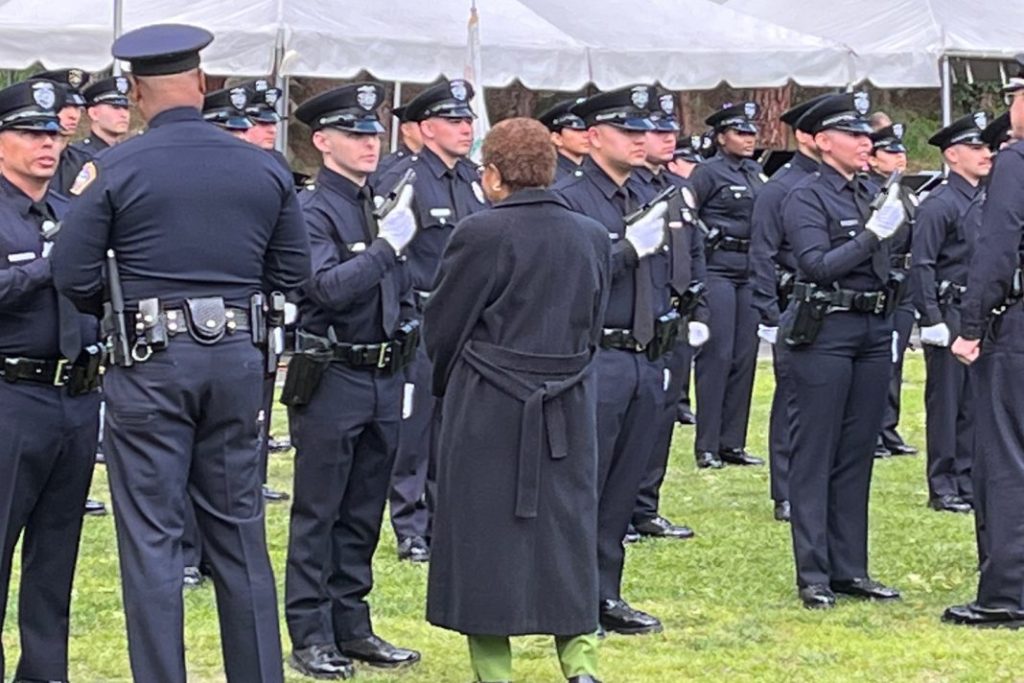Mayor Karen Bass plans for “personnel reform” have raised alarms among some who fear that lowering standards for new recruits could compromise the department’s effectiveness and put the public’s safety at risk.
It could become a political witch hunt against officers who hold different political views
In particular, the mayor’s proposal to remove officers with alleged “right-wing extremist” ties has sparked controversy, with critics warning that it could become a political witch hunt against officers who hold different political views. Moreover, the notion of what constitutes “extremist ties” could be a subjective and arbitrary standard, further fueling concerns about political bias and abuse of power.
The LAPD has historically faced challenges in recruiting and retaining officers, particularly among minority communities. Critics argue that lowering standards could exacerbate these issues and ultimately harm the department’s ability to serve and protect the diverse communities of Los Angeles.
As the debate continues to unfold, one thing is clear: the mayor’s proposed changes to the LAPD could have far-reaching consequences for the department and the city it serves.
Despite the mayor’s desire to increase the number of detectives and utilize California’s red-flag laws, staffing the LAPD has become a pressing issue. The department is facing a significant exodus of officers, with approximately 600 officers expected to retire or leave in the next year, a rate that is 20% higher than normal.

The staffing shortage is not unique to Los Angeles, as many cities across the country have experienced similar challenges in retaining police officers. The anti-police rhetoric of 2020 and the calls to defund the police have contributed to these staffing issues, as many officers have been demoralized and discouraged by the lack of support from local politicians and communities.
Retired Sergeant Betsy Branter Smith, a spokeswoman for the National Police Association, has noted that Los Angeles is among the cities that have been hit hardest by these staffing problems. Mayor Bass herself acknowledged during the Black Lives Matter riots that the slogan “defund the police” was one of the worst she had ever heard.
The city and its residents will undoubtedly feel the impact of these decisions
As the LAPD faces a critical shortage of officers and potential changes to its recruitment and retention policies, the future of the department remains uncertain. The city and its residents will undoubtedly feel the impact of these decisions, as they will determine the LAPD’s ability to fulfill its crucial role of protecting and serving the people of Los Angeles.
The mayor’s goal of increasing the number of officers in the LAPD is reflected in a summary of her public safety plans obtained by the Los Angeles Times. According to the summary, the mayor aims to attract a more diverse pool of candidates and increase the overall number of new recruits and lateral hires.
To achieve these goals, the personnel department will be tasked with hiring an additional 500 new recruits and lateral hires per year. The department will also implement innovative recruitment strategies aimed at attracting non-traditional candidates, such as social workers, teachers, and nurses.
However, some critics have expressed concern that this push for quantity over quality could lead to a further erosion of the department’s standards and effectiveness. Moreover, the plan to evaluate the personnel process and identify obstacles to entry for recruits who fail to qualify for training raises questions about the potential for lowering standards or overlooking red flags in the recruitment process.
As the LAPD faces a challenging staffing crisis, the pressure to recruit and retain officers is understandably high. However, the stakes are equally high when it comes to ensuring that the department maintains the highest standards of professionalism, accountability, and effectiveness in serving and protecting the people of Los Angeles.

The summary of Mayor Bass’s public safety goals obtained by the Los Angeles Times includes recommendations aimed at removing obstacles to recruitment, particularly for ethnic groups that have been disproportionately left out of new officer training. This is part of the mayor’s push for more diverse candidates and a larger overall pool of recruits.
However, some have expressed concerns that these efforts may come at the cost of lowering the standards for new officers. Tom Saggau, a spokesman for the Los Angeles Police Protective League, has warned that the rush to onboard new recruits may lead to a decline in the quality of candidates, especially if the mental and physical fitness requirements are lowered.
Saggau has cautioned that lowering the standards could potentially create more problems for the LAPD than simply a shortage of officers. In an interview with Fox News Digital, he stated, “We think that particular provision or that goal or that idea is dangerous.”
As the LAPD grapples with the challenge of retaining and recruiting officers, it is essential to balance the need for diversity and increased numbers with the critical importance of maintaining high standards for recruitment and training. The future of the department and the safety of Los Angeles residents depend on striking the right balance.



